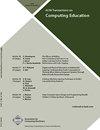实践社区奖学金计划对学生计算机身份的影响
IF 3.2
3区 工程技术
Q1 EDUCATION, SCIENTIFIC DISCIPLINES
引用次数: 0
摘要
虽然美国计算机专业的入学人数呈增长趋势,但他们仍在努力解决与计算机专业本科生的保留和持久性有关的问题。学者们认为对计算持久性有影响的一个构念是计算身份,它由诸如认可、绩效/能力信念、归属感和兴趣等构念形成。同样,参与学者们所谓的实践社区(CoP)可以帮助他们发展自己的计算身份。为了帮助促进计算身份的发展,在三所大型公立大学设计了一个名为Flit-Path(佛罗里达IT通往成功之路)的计划。Flit-Path是利用实践社区固有的原则建立的,其目标是招募和留住计算机专业的学生。Flit-Path计划利用课程和课外支持,吸引在计算机学科(如计算机工程、计算机科学和信息技术)有经济需求的学术上有天赋的学生,并通过奖学金提供经济援助。本研究的指导性研究问题是:计算机实践社区(Flit-Path program)对学生的计算机身份,特别是对识别、表现/能力、归属感和兴趣的构式的影响是什么?为了解决这个问题,我们使用了一种有效的调查工具,将64名参加了Flit-Path项目的计算机专业学生与来自同一所大学的学生进行比较,这些学生的大学年限、计算机GPA、种族/民族、性别、家庭/环境支持以及在家外工作时间相匹配。为了比较两组学生,研究小组在r语言中使用了多元匹配方法。研究结果显示,Flit-Path项目的学生表现出更高的计算身份。参加Flit-Path项目的学生比没有参加Flit-Path项目的学生在计算机领域获得了更高的认可、表现/能力和归属感。对兴趣也有边缘性的积极影响。总之,研究结果表明,在计算机课程中设计良好的CoP干预措施可以对学生对计算机的认同产生显著影响,并最终对他们的持久性产生影响。本文章由计算机程序翻译,如有差异,请以英文原文为准。
The Impact of a Community of Practice Scholarship Program on Students’ Computing Identity
While computing programs in the U.S. are experiencing growth in enrollment trends, they are still grappling with matters related to retention and persistence of computing undergraduates. One construct identified by scholars as having an impact on persistence in computing is computing identity which is shaped by constructs such as recognition, performance/competence beliefs, sense of belonging, and interest. Likewise, participation in what scholars call communities of practice (CoP) can aid in the development of their computing identity. To help foster computing identity development, an initiative was designed at three large public universities named Flit-Path (Florida IT Pathways to Success). Flit-Path was established using the principles inherent to communities of practice with the goal of recruiting and retaining computing students. The Flit-Path program leveraged curricular and co-curricular support to engage academically talented students with financial need in computing disciplines (e.g., computer engineering, computer science, and information technology) as well as provided financial assistance via scholarships. The guiding research question for this study was - What is the impact of a computing community of practice (the Flit-Path program) on students’ computing identity, specifically the constructs of recognition, performance/competence, sense of belonging, and interest? In order to address this question, a validated survey instrument was used to compare 64 computing students who enrolled in the Flit-Path program with students from the same universities with matched years in college, computing GPA, race/ ethnicity, gender, home/ environment support, and work hours outside the home. For comparing the two groups, the research team used multivariate matching methods in R. The results of the study revealed students in the Flit-Path program demonstrated substantially higher computing identities. Students who participated in the Flit-Path program experienced higher recognition, performance/competence, and sense of belonging in the computing field than their non-Flit-Path counterparts. There was also a borderline positive effect for interest. Together, the results indicate that well-designed CoP interventions in computing programs can have a significant effect on students’ identification with computing and ultimately their persistence.
求助全文
通过发布文献求助,成功后即可免费获取论文全文。
去求助
来源期刊

ACM Transactions on Computing Education
EDUCATION, SCIENTIFIC DISCIPLINES-
CiteScore
6.50
自引率
16.70%
发文量
66
期刊介绍:
ACM Transactions on Computing Education (TOCE) (formerly named JERIC, Journal on Educational Resources in Computing) covers diverse aspects of computing education: traditional computer science, computer engineering, information technology, and informatics; emerging aspects of computing; and applications of computing to other disciplines. The common characteristics shared by these papers are a scholarly approach to teaching and learning, a broad appeal to educational practitioners, and a clear connection to student learning.
 求助内容:
求助内容: 应助结果提醒方式:
应助结果提醒方式:


